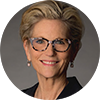Download PDF

For almost 30 years, I’ve worked in close proximity to Jeffrey Haag, one of our practice’s neuro-ophthalmologists. We frequently share cases and advice, and it’s a collaboration that greatly benefits my patients. I sometimes tell a patient, “I’m the optic nerve doctor if the problem is glaucoma, and Dr. Haag is the optic nerve doctor for everything else.” I think of Jeff and our other neuro-ophthalmologists, Tim Kietzman and Evan Price, as the ocular internists, neuro-imaging experts, eye movement gurus, and all-around eye brainiacs. Neuro-ophthalmologists are invaluable, but we don’t have enough of them.
While a shortage of neuro-ophthalmologists is an old problem, the concern about supply and demand is growing. In a survey of its U.S. members (with a 95% response rate!), the North American Neuro-Ophthalmology Society found that only eight states have enough neuro-ophthalmologists—and that six states don’t have a single one. In an analysis of the findings, the authors state, “At least one-third of respondents reported being 25+ years beyond fellowship training, suggesting that access will worsen if a robust training pipeline is not created immediately.”1 This academic year (2020-2021), only 17 of the neuro-ophthalmology fellowship positions were filled, and 13 remain unfilled.
Concerned about the deficit, Courtney Francis, a neuro-ophthalmologist at the University of Washington, decided to assess the barriers to pursuing a career in neuro-ophthalmology. She conducted a survey of U.S. PGY-4 ophthalmology residents about their perceptions of neuro-ophthalmology.2 Along with John Chen, a neuro-ophthalmologist at the Mayo Clinic, she discusses three common misconceptions: It’s a nonsurgical subspecialty, it’s poorly compensated, and it’s limited to academia.
Let’s address these assumptions. First, although some residents characterized neuro-ophthalmology as a nonsurgical subspecialty, this is often not true. In fact, some neuro-ophthalmology fellowships offer extensive surgical training in strabismus surgery, orbital surgery, temporal artery biopsies, Botox injections, and/or cataract surgery. My colleague Jeff Haag was a superb and busy cataract surgeon for many years. Although he recently retired from surgery, he continues his comprehensive appointments, interspersed with neuro sessions. Because neuro-ophthalmology encompasses so many diseases, there are diverse options for a surgical practice.
What of the second perception regarding compensation? In fact, there is a wide range of salaries and compensation packages for neuro-ophthalmologists, and they are often quite competitive. Recognizing that neuro exams can be time-consuming, some groups will subsidize their subspecialists who generate less revenue because it allows other ophthalmologists to be more efficient. Another option: Some neuro-ophthalmologists have busy surgical practices or general comprehensive sessions, which bolsters their revenue stream.
Finally, is neuro-ophthalmology limited to academia? No. As I noted, our practice has three busy neuro-ophthalmologists. The opportunities in private practice will increase, especially given the trend toward consolidation into groups who wish to provide care for all ophthalmic subspecialties.
The best reasons for choosing a career in neuro-ophthalmology come from the neuro-ophthalmologists themselves. As Peter Quiros, a neuro-ophthalmologist at UCLA Stein Eye Institute and Doheny Eye Institute, says, “Neuro-ophthalmology covers all the reasons many of us cite for becoming ophthalmologists: We improve vision and quality of life, we diagnose and treat eye and systemic disease, and we perform surgeries that have impactful outcomes on patient lives, all while often being the final authority on the patient’s problem.” I hope neuro becomes the new “hot” subspecialty in ophthalmology.
___________________________
1 DeBusk AA et al. J Neuroophthalmol. In press.
2 Solomon AM et al. Factors affecting ophthalmology resident choice to pursue neuro-ophthalmology fellowship training. Accepted by J Neuroophthalmol.